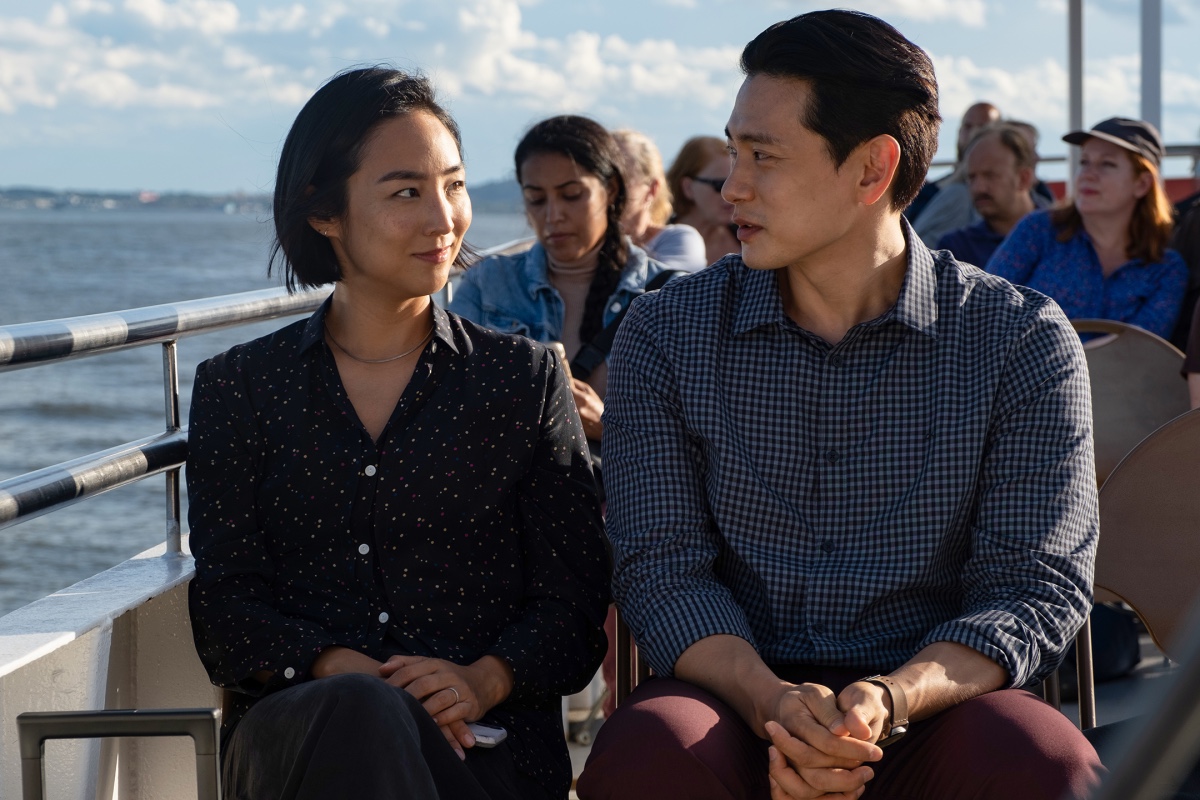Celine Song’s ‘Past Lives’ Is an Intimate, Melancholy Examination of ‘What If?’
4/5 stars.

In the world of romantic dramas, a love triangle is about as familiar and foundational to the genre as it gets, but I guarantee you’ve never seen one as messy, melancholy, or heartbreaking as the trio at the center of Past Lives, Celine Song’s ruminative romance/Sundance breakout hit. Though its laid back pacing and slice-of-life approach to narrative may make the first hour feel particularly lengthy, the emotional potency of Past Lives is undeniable—and between Song’s long, lingering shots and the combined prowess of Greta Lee, Teo Yoo, and John Magaro, the portrait painted is a deeply personal, affecting one.
Starring Lee, Yoo, and Magaro, Past Lives follows Nora (Lee), an ambitious, spirited girl growing up in South Korea who develops an early puppy love crush on classmate Hae Sung (Yoo). Though the duo spends a precious few months joined at the hip, they’re torn apart by Nora’s family deciding to uproot and emigrate to the United States. Twelve years later, Nora is living a successful, independent life as an up-and-coming writer in New York City, and her world is once again shaken when a chance encounter (on Facebook, of all places) brings Hae Sung back into her life.
At first, their remote correspondence is awkward and unfamiliar, but the more time they spend remotely reconnecting, the closer the two once again become. By the time Hae Sung works up the nerve to make an in-person visit to Nora in New York, it’s been another 12 years, and Nora has gotten married to fellow writer Arthur (Magaro). Over the course of his short visit, the complicated feelings Nora and Hae Sung have been dancing around for decades begin to bubble to the surface, and the two begin to question how their lives together may have gone if Nora had never left South Korea.
More than anything else, Past Lives functions as quiet and painstakingly intimate examination of Nora’s sense of self, and how her determined independence and unwillingness to give up on her pursuit of success shapes her life—as to whether it’s for the better or for worse, that’s left up to the viewer to decide. Admittedly, the film’s first hour does move by slowly, but even if it can’t quite match the heat and passion of the last act (once Nor and Hae Sung have reunited in person), it does put all the right emotional pieces in place for the eventual payoff to be as potent as possible. Lee’s performance (as with Yoo’s turn and Song’s direction) is an exercise in subtlety.
Nothing in Past Lives is particularly overt or in-your-face, but that doesn’t mean it isn’t achingly emotional. As we watch Nora grow from a confident child to an ambitious young woman to a conflicted adult, Lee finds small but crucial ways to define the different stages of Nora’s life, while still keeping the character’s confident, self-assured core. Though she ends up in a messy, complicated situation, Lee imbues her with a quiet strength and ever-present thoughtfulness.
But while she draws you effortlessly in on her own, Lee shines even brighter when opposite Yoo—their in-sync performances capture the bumbling tension and almost child-like uncertainty of two adults who once thought they were each other’s world, but now feel like barely more than strangers. It’s a bizarre dichotomy but one at the very core of the film’s ethos: the idea that two people could know each other so well without really knowing each other at all—at least, not anymore. In every stolen glance and awkward laugh, your heart aches for the lost love between Nora and Hae Sung. They’re both clearly still harboring some type of feelings for each other, but also hyper-aware of how coming anywhere close to acting on said feelings just isn’t an option.
In the time they’ve been apart, Nora has gotten married—and though (as the character verbally acknowledges) Nora’s husband Arthur (Magaro) may have been presented as the arbitrary roadblock to Nora and Hae Sung’s happiness, Song subverts convention and instead opts to turn Arthur into an intensely relatable, sympathetic figure. The second Arthur sees Nora and Hae Sung together, the writing is on the wall—he knows they’ve got something special, something he isn’t able to offer Nora. But instead of getting jealous or defensive, Arthur is also self-aware and open-hearted enough to simply step back and allow Nora and Hae Sung to work out their feelings for themselves, instead of inserting himself into a decades-long romance because he feels threatened by their relationship.
When the film reaches its ending, you’re left gutted, but also somehow at peace. It’s a tough pill to swallow, but one executed with incredible tenderness and nuance on Song’s part, and her commitment to exploring the muddy waters of lost love without decisively telling the viewer what should or shouldn’t have happened between her leads is as rare as it is moving. Though its cool color palettes, understated cinematography, and slow-but-steady pace may make for a viewing experience that can at times feel lengthy, the strength of Past Lives‘ trio of lead performances and the care with which Song tells their story results in a beautifully melancholic film—undoubtedly one of this year’s most moving.
(featured image: A24)
Have a tip we should know? tips@themarysue.com